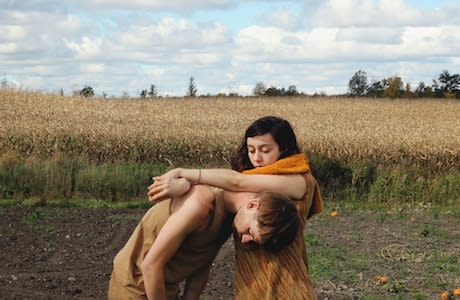Distance makes the heart grow fonder, and evidently, also pushes the music writing process further for Raph and Agor of Blue Hawaii. The electro-ambient duo — and real life couple — spent the better part of two years apart, thanks to Raph's demanding tour schedule with Braids and Agor's penchant for moving from city to city. But when it came time to write and record their follow-up to 2010's Blooming Summer, the pair found the separation to be a positive and productive way to approach the music.
"We just didn't need to do it together, we didn't need to talk," Raph explains. "I would get into a much more meditative state when I was alone."
Agor agrees, adding that "there was so much separation that it was the right thing to do."
Partly completed in separate cities, and partly recorded separately in the same house, their fractured work aesthetic was also mimicked in the music on their new album, Untogether. Often before even finishing an entire song, compositions would get chopped, reworked and reassembled into moody melancholic sounds that still resembled songs, a "collage of sorts" as Agor puts it.
"We kept correcting them," Raph says, of the songs. "We would be like, 'Let's spend two days destroying everything and then building it back together.'"
As Agor ponders, "Where does the band stop and electronic ambient composition begin? You can make a really interesting sound with computers and stuff, but you can also be a band with songs and Untogether straddles that sound."
And when stripped down, many of Untogether's jigsaw puzzles are simple compositions that can stand alone as beautiful songs, such as the wistfully acoustic "Try to Be" or the dizzyingly layered "Sierra Lift."
The duo admits that Blooming Summer was an unabashed pop effort, but the abstractions of Untogether were a deliberate stray from that. "It doesn't give you everything you want immediately as a listener," says Raph. "You have to be very patient; the music makes you work, otherwise it's kind of confusing."
"Because of the concept of us being separated, things being cut up and the way our music scene had developed and changed, all the broken things we had been experiencing at the time made it so appropriate for us to make the record this way," Agor explains. "But I'm feeling better about life now and maybe the next thing we lay down will be something more straightforward."
"We just didn't need to do it together, we didn't need to talk," Raph explains. "I would get into a much more meditative state when I was alone."
Agor agrees, adding that "there was so much separation that it was the right thing to do."
Partly completed in separate cities, and partly recorded separately in the same house, their fractured work aesthetic was also mimicked in the music on their new album, Untogether. Often before even finishing an entire song, compositions would get chopped, reworked and reassembled into moody melancholic sounds that still resembled songs, a "collage of sorts" as Agor puts it.
"We kept correcting them," Raph says, of the songs. "We would be like, 'Let's spend two days destroying everything and then building it back together.'"
As Agor ponders, "Where does the band stop and electronic ambient composition begin? You can make a really interesting sound with computers and stuff, but you can also be a band with songs and Untogether straddles that sound."
And when stripped down, many of Untogether's jigsaw puzzles are simple compositions that can stand alone as beautiful songs, such as the wistfully acoustic "Try to Be" or the dizzyingly layered "Sierra Lift."
The duo admits that Blooming Summer was an unabashed pop effort, but the abstractions of Untogether were a deliberate stray from that. "It doesn't give you everything you want immediately as a listener," says Raph. "You have to be very patient; the music makes you work, otherwise it's kind of confusing."
"Because of the concept of us being separated, things being cut up and the way our music scene had developed and changed, all the broken things we had been experiencing at the time made it so appropriate for us to make the record this way," Agor explains. "But I'm feeling better about life now and maybe the next thing we lay down will be something more straightforward."
